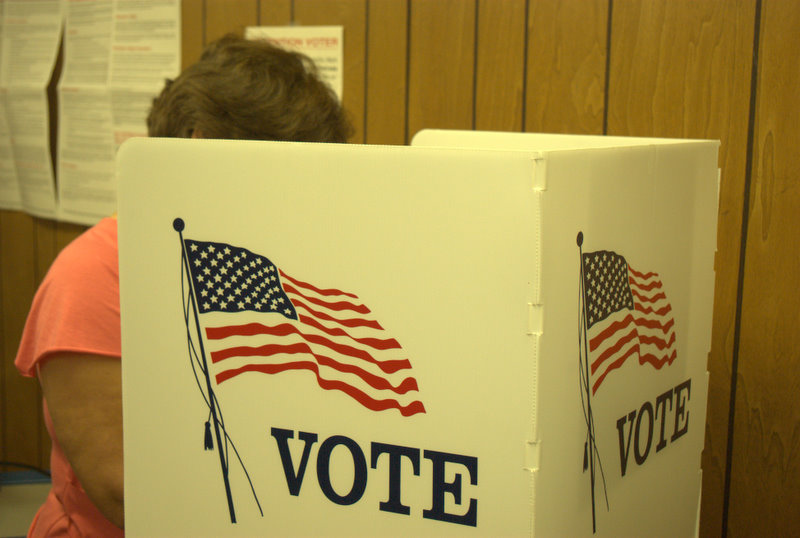A new report from the University of New Mexico’s Department of Political Science indicates that voter confidence is higher in state and county elections while voters are more polarized in national elections.
This and other findings were discussed during a virtual press conference on 2020 voting information. New Mexico Secretary of State Maggie Toulouse Oliver also said during the press conference that if the new voting rights bill is passed, the NMSOS office would expect to see an increase in civic engagement.
Toulouse Oliver held the virtual press conference on Wednesday to discuss the results of the report, called 2020 New Mexico Election Administration, Voter Security, and Election Reform Report. During the discussion, she said that if SB 8, sponsored by state Sen. Peter Wirth, D-Santa Fe, passes, NMSOS would “see an increase in participation.” Gov. Michelle Lujan Grisham proposed expanding voting rights this year.
One of the proposals of legislation is to expand voting rights for formerly incarcerated individuals.
It would also allow qualified residents who are 16 to vote in local and municipal elections. Toulouse Oliver said that would allow students to have more say in school board elections.
“There’s a lot of activism dealing with school boards making decisions affecting the lives of kids, whether to mask or vaccinate, gun violence and how these decisions pertain to trans and queer kids so they feel they are safe and comfortable in their schools,” she said.
The report
The lead author of the report, Professor Lonna Rae Atkeson, participated in the press conference virtually and called 2020 a “unique” election due to the COVID-19 pandemic.
For instance, according to the report, in 2020, the number of ballots cast by mail tripled to 35 percent as opposed to previous elections when only 10 percent of individuals in New Mexico voted by mail. One of the report’s recommendations is that the NMSOS add a feature that provides information to voters on whether their ballot was accepted for counting when voting by mail. The report also recommends that vote by mail regulations change to prevent ballot harvesting. According to the report, it is a violation for any person “who is not an immediate family member to collect and deliver a ballot” to do so, but there are no consequences if the law is violated.
Toulouse Oliver highlighted the fact that the 2020 general election in New Mexico produced “the largest voter turnout ever. It was the highest we’ve ever seen.” She said almost 70 percent of registered voters voted in 2020. She said voters had “a positive experience with increased vote by mail.” She said the NMSOS is trying to make vote by mail a permanent choice through the legislative process this year.
Toulouse Oliver also highlighted that 94 percent of voters surveyed said that they felt poll workers were helpful and that they felt safe in voting in-person in 2020.
“That speaks volumes. These are great numbers. We must increase confidence in the integrity of elections and how elections work,” Toulouse Oliver said.
The report showed that voters indicated they were less confident with national election results than state or county level results. About three in four voters, or 77 percent, were either very confident or somewhat confident that their vote was counted correctly. For county level elections, voter confidence ticked down slightly to 74 percent while 70 percent of voters had confidence in state-wide elections.
But in national races, two in five voters indicated they were not too confident or not confident at all, according to the report.
Political party affiliation appears to strongly influence confidence levels in voters with Democrats showing much higher levels of confidence in voting outcomes than Republicans. Decline-to-State and third-party voters were more likely to show confidence in election results, according to the report.
The analysts noted changes in voter confidence, particularly divided by party affiliation, after the 2020 election results, with voters who voted for Pres. Joe Biden reporting increasing confidence and those who voted for former Pres. Donald Trump showing decreased confidence.
This led to an increase in voter confidence polarization across party supporters and larger gaps between voting groups, according to the report.
Voting privacy came up as an issue in the report’s findings, with more than one third, or 37 percent, of voters believing that their vote is not secret while just over one-quarter, or 27 percent, who believe that it is. The rest, 36 percent, were unsure.
The report recommends that the NMSOS office should educate the public on how the secrecy of the ballot is maintained to ensure an understanding that their vote is secret.
Another of the report’s recommendations is for the NMSOS to encourage voting locations to adopt voter privacy sleeves for in-person voting.
In addition, the report found that Blacks and Native Americans were correctly identified — 70 percent and 73 percent respectively— at the polling booth, while Asian voters reported they were identified correctly 91 percent of the time and whites reported they were identified correctly 87 percent of the time. Hispanics, biracial and multiracial voters said they were identified correctly 82 percent of the time.
The survey is based on results from 13,550 voters without emails and 34,795 voters who included emails with their voter registration. The data was obtained from the NMSOS office and the survey was conducted immediately after the election. The University of New Mexico’s Department of Political Science has been taking surveys and producing the report since 2006.
This article was originally posted on Report shows low voter confidence for national election results, but more confidence in state and county elections











More Stories
Milwaukee’s election boss needs to stop ‘getting out the vote’
Early voting under way for Texas primary election runoff
Thousands of Arkansas residents cast ballots before Tuesday’s primary